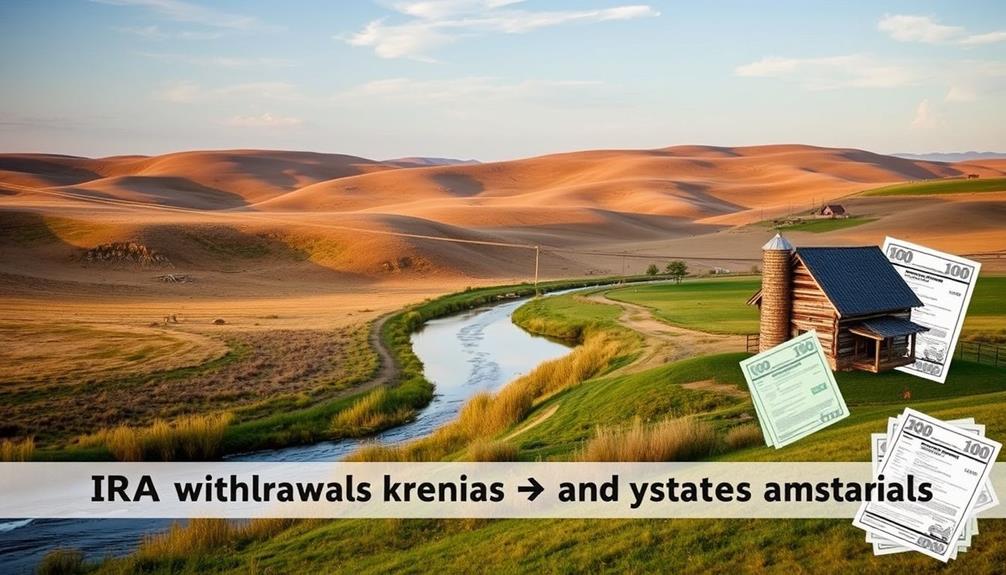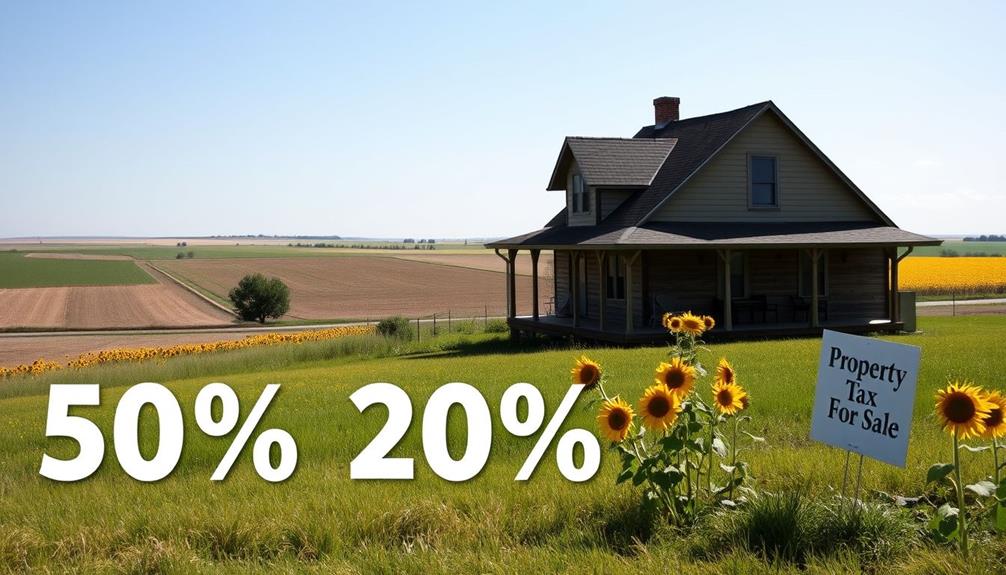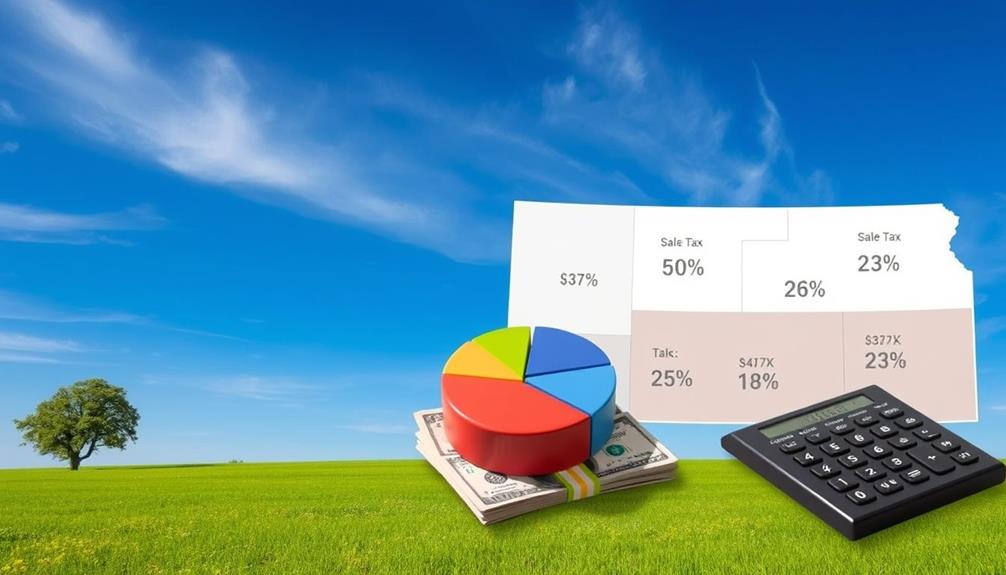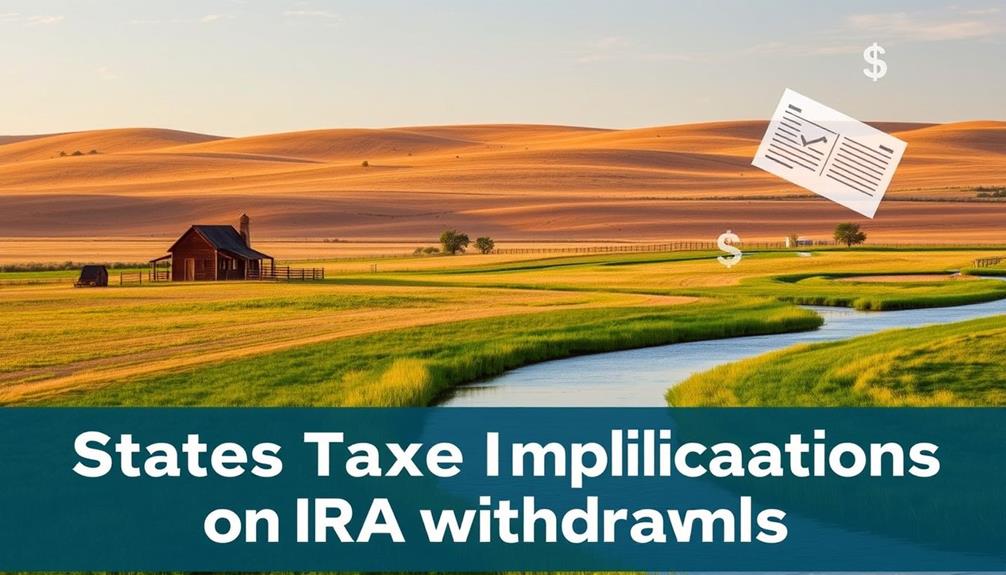When you take out funds from your traditional IRA in Kansas, the full amounts are subject to taxation as regular income. The state income tax rates in Kansas for these withdrawals vary from 3.1% to 5.7%, depending on how much you earn. Unlike Social Security or public pension earnings, there are no exceptions for IRA distributions, so it’s crucial to plan carefully in terms of timing and amounts to minimize the tax you owe. If your adjusted gross income (AGI) goes over $75,000, you could also end up owing taxes on your Social Security benefits. Being aware of these details will assist you in effectively managing your retirement income and reducing your overall tax burden.
Key Takeaways
- Traditional IRA withdrawals in Kansas are fully taxable as ordinary income, with rates ranging from 3.1% to 5.7%.
- There are no income exemptions or thresholds for taxation on IRA distributions in Kansas.
- Social Security income may be exempt from state taxes if your AGI is $75,000 or less.
- Effective tax planning involves timing withdrawals to maintain an AGI below the $75,000 threshold to minimize tax liabilities.
- Consult a financial advisor to optimize tax strategies for managing IRA withdrawals and retirement income in Kansas.
Kansas Retirement Tax Overview

When planning for retirement in Kansas, it's crucial to understand how state taxes impact your income, especially withdrawals from your IRA. Kansas state income taxes can greatly affect your retirement distributions, particularly since withdrawals from your IRA are fully taxable. These taxes range from 3.1% to 5.7%, depending on your income level. If your adjusted gross income (AGI) exceeds certain thresholds, you'll face higher tax liabilities on your withdrawals.
However, you can find some tax relief if you rely on other sources of income. For instance, Social Security income is exempt from state taxes for seniors with an AGI of $75,000 or less, and public pension income is also tax-exempt. This means that if most of your retirement income comes from these sources, your overall tax burden may be lower.
Additionally, it's worth noting that Kansas doesn't impose estate or inheritance taxes, which can be beneficial for your estate planning.
Understanding these nuances in Kansas state tax laws can help you strategize your retirement income and maximize your financial security as you retire.
Taxation of IRA Withdrawals

Understanding the tax implications of IRA withdrawals is essential for Kansas retirees. In Kansas, when you withdraw from a traditional IRA, those amounts are subject to state income tax. This tax ranges from 3.1% to 5.7%, depending on your income level.
Unlike Social Security benefits, which are exempt for seniors with an AGI of $75,000 or less, there are no income thresholds for tax exemptions on IRA distributions in Kansas.
As a retiree, it's important to report your IRA withdrawals on your state tax returns, as these are taxed as ordinary income. The taxation of IRA withdrawals can greatly impact your overall financial planning.
It's crucial to evaluate how these withdrawals interact with other income sources you may have.
To navigate the complexities of state income tax and the tax implications of your IRA withdrawals, consulting with a financial advisor is a smart move. They can help you understand how these withdrawals affect your state tax liabilities, ensuring you make informed decisions that align with your retirement goals.
Social Security Taxability

When planning for your retirement in Kansas, understanding the AGI threshold for Social Security benefits is essential.
If your income exceeds $75,000, you'll face state income tax on those benefits, which can greatly impact your finances.
Additionally, your filing status can further influence your tax situation, so it's wise to strategize accordingly.
AGI Threshold Importance
Steering through the AGI threshold is essential for retirees in Kansas who want to maximize their tax savings on Social Security income. If your Adjusted Gross Income (AGI) exceeds $75,000, your Social Security benefits become taxable, which can greatly impact your overall financial situation.
Staying below this threshold can help you avoid state taxes on your Social Security income, allowing you to keep more of your hard-earned money.
Understanding how your AGI is calculated is important. It includes all sources of income, so any withdrawals from retirement accounts will affect your total AGI.
If you're strategic about your withdrawals from retirement accounts, you can manage your AGI to remain under the $75,000 limit.
Filing Status Considerations
Your filing status plays an important role in determining the taxability of your Social Security benefits in Kansas. For individuals with an adjusted gross income (AGI) of $75,000 or less, your benefits remain untaxed, providing considerable relief.
However, if your AGI exceeds that threshold, the state income tax applies to your Social Security income, with rates ranging from 3.1% to 5.7%.
Single filers face different AGI limits compared to married couples filing jointly, which means you could have a higher AGI threshold if you're part of a couple. This difference can greatly influence your overall tax implications, especially concerning retirement income.
If you're married and filing jointly, understanding this distinction is vital for effective tax planning. Failing to take into account your filing status may lead to unexpected tax burdens, particularly if you're nearing that AGI limit.
By recognizing how your filing status impacts the taxability of your Social Security benefits, you can better navigate your financial landscape, ensuring you maximize your retirement income while minimizing your state income tax obligations.
Ultimately, staying informed about these nuances can aid your long-term financial planning.
Tax Planning Strategies
As you approach retirement, implementing effective tax planning strategies becomes vital to manage the taxability of your Social Security benefits in Kansas.
In Kansas, if your adjusted gross income (AGI) is $75,000 or less, your Social Security benefits are exempt from state taxes, providing welcome tax relief. However, if your AGI exceeds this threshold, your Social Security income becomes fully taxable at state rates ranging from 3.1% to 5.7%.
To minimize your tax liability, carefully assess your overall income levels and consider ways to keep your AGI below the $75,000 limit. This may involve timing your retirement income withdrawals or using tax-efficient investment strategies.
It's also important to understand how your filing status affects your tax situation, as this can greatly impact your overall tax planning.
Consulting with a financial advisor can be invaluable in steering through the complexities of AGI calculations and optimizing your tax strategies regarding Social Security benefits.
Other Retirement Income Taxes

Many retirees might not realize that various forms of retirement income are subject to taxation, which can greatly impact their financial planning. In Kansas, while Social Security and public pension income are exempt for eligible seniors, traditional IRA withdrawals are fully taxable as ordinary income. This means you'll need to factor these withdrawals into your adjusted gross income (AGI) when planning your taxes.
To help you understand the different types of retirement income and their tax implications, here's a quick table:
| Type of Income | Tax Status in Kansas | Notes |
|---|---|---|
| IRA Withdrawals | Fully taxable | Subject to state tax (3.1%-5.7%) |
| Social Security | Exempt | Not subject to state tax |
| Public Pension Income | Exempt | Not subject to state tax |
Given that the state does not offer specific exemptions for 401(k) or IRA income, it's crucial for Kansas retirees to adopt effective tax planning strategies. By understanding these nuances, you can minimize the impact of state taxes on your retirement income and guarantee a more secure financial future.
Kansas Property Tax Rates

When it comes to property taxes in Kansas, you'll notice the median effective rate is 1.42%, higher than the national average.
If you're a senior earning $40,500 or less, programs like the Homestead Refund and SAFE Senior can help lighten your tax load.
Additionally, keep in mind that local tax variations might affect what you end up paying.
Median Property Tax Rate
In Kansas, property owners face a median effective property tax rate of 1.42%, which is particularly higher than the national median of 1.01%. This means that even with generally low property values, the higher tax rate can create a significant overall tax burden.
You may find that the average annual property tax payment in Kansas is around $2,355, impacting your finances, especially if you rely on retirement income.
For seniors, there are options available to help lessen the impact of property taxes. If your income is $40,500 or less, you might qualify for the Homestead refund, which can provide some relief from these expenses.
Additionally, the SAFESR program offers refunds of up to 75% of property taxes for qualifying seniors, potentially easing your financial strain even further.
Understanding the median property tax rate in Kansas is vital for budgeting and planning your retirement. By exploring these relief programs, you can navigate your property tax obligations more effectively and guarantee your retirement income goes further.
Make certain to check your eligibility for these valuable programs to take advantage of the benefits they offer.
Senior Property Tax Refunds
Maneuvering property tax obligations can be challenging for seniors in Kansas, but the state offers valuable refund programs to ease this burden. If you're a retiree with an income of $40,500 or less, you might qualify for a Homestead refund. This program provides essential financial relief on your property taxes, helping to alleviate some of the stress associated with retirement expenses.
Additionally, the SAFE Senior property tax refund program allows qualifying seniors to receive refunds of up to 75% of their property taxes paid.
With Kansas having a median effective property tax rate of 1.42%, which is above the national average, these refunds can make a significant difference in your financial planning.
Average annual property tax payments in Kansas amount to around $2,355, so taking advantage of these senior property tax refunds can help you manage your budget more effectively.
By understanding and utilizing these programs, you can reduce the impact of property taxes on your retirement income, ensuring you enjoy your golden years with less financial strain.
Don't overlook these options when planning your retirement in Kansas!
Local Tax Variations
Property tax rates in Kansas can vary widely from one county or municipality to another, impacting how much you ultimately pay. The median effective property tax rate in Kansas stands at 1.42%, which is considerably higher than the national median of 1.01%. This means your property tax liability might differ greatly depending on where you live.
In Kansas, the average annual property tax payment is around $2,355, but local tax rates could lead to higher or lower amounts based on your specific area.
For seniors with an income of $40,500 or less, the state offers a Homestead refund, providing essential financial relief on property taxes. Additionally, the SAFE Senior property tax refund program allows qualifying seniors to receive refunds of up to 75% of their property taxes paid, further easing their financial burden.
Understanding local tax rates and how they apply to your property can help you make informed decisions regarding your finances, especially if you're considering IRA withdrawals.
Always check with your county municipalities to stay updated on tax rates and available relief programs.
Sales Tax Considerations

Sales tax plays an essential role in your financial planning, especially when you're considering IRA withdrawals in Kansas. The state's sales tax rate of 6.5%, combined with local taxes, can push total rates above 11% in some areas. This affects your overall cost of living, particularly as a retiree relying on your IRA withdrawals.
When budgeting for expenses, keep these sales tax considerations in mind:
- Groceries: Kansas currently taxes groceries at 2%, although this will be eliminated by 2025. Until then, include this in your monthly expenses.
- Property Taxes: Kansas has property taxes above the national median, which can strain your disposable income. Factor these into your long-term financial plans.
- General Goods and Services: Sales taxes apply broadly, affecting everything from clothing to dining out. Verify your budget reflects these potential costs.
Planning for Retirement Taxes

As you plan your financial future, understanding the tax implications of your IRA withdrawals in Kansas is essential. Unlike Social Security and public pensions, which may be exempt from state taxes for qualifying seniors, your IRA distributions are fully taxable. Kansas state income tax rates for individuals range from 3.1% to 5.7%, meaning your tax bill could increase considerably depending on your withdrawal amounts.
To navigate this effectively, consider your adjusted gross income (AGI). If your AGI exceeds $75,000, taxes on Social Security can kick in, adding another layer to your tax planning strategies. Timing your withdrawals can help minimize your tax impact, allowing you to remain within a lower tax bracket.
Additionally, be mindful of available deduction opportunities that could offset some of your tax liabilities. Consulting with a financial advisor can provide tailored guidance on managing your retirement income in light of Kansas tax regulations.
They can help you develop a strategy that aligns with your financial goals while minimizing your tax burden on IRA distributions. Remember, proactive planning now can lead to considerable savings in the long run.
Frequently Asked Questions
Do You Pay State Income Tax on IRA Withdrawals?
Yes, you pay state income tax on IRA withdrawals. The rates vary based on your income level, so it's important to account for this when planning your finances during retirement.
What Retirement Benefits Are Exempt From Kansas Income Tax?
Imagine a world where all retirement income is tax-free! In Kansas, though, only Social Security benefits and public pensions escape state taxes, leaving most retirement accounts, like IRAs, subject to taxation. You've got to plan wisely!
What States Require Tax Withholding on IRA Distributions?
Some states, like California and New Jersey, require tax withholding on IRA distributions unless you opt out. It's crucial to check your state's laws to understand your withholding obligations and avoid unexpected tax bills.
What Is the Tax Break for Seniors in Kansas?
In Kansas, you'll find tax breaks for seniors like exemptions on Social Security and public pension income. Plus, programs like SAFE Senior and homestead refunds help reduce property tax burdens for qualifying individuals.
Conclusion
Maneuvering Kansas tax implications for IRA withdrawals can feel overwhelming, but understanding the landscape is essential. While some retirees might enjoy tax breaks on Social Security, others face hefty tax bills on their IRA distributions. Balancing these factors is vital for your retirement planning. As you prepare for this new chapter, remember: a well-informed strategy can transform potential pitfalls into opportunities for financial security. Take charge of your retirement tax planning today, and make your money work for you.








